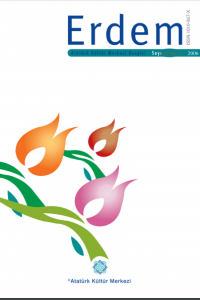Abstract
Türk Sanatının önemli bir kolu olarak gelişen madeni eserler, diğer sanat dallarıyla beraber Osmanlı döneminde zirveye ulaşmış,
çok çeşitli form ve bezemelerle kendini göstermiştir. Ancak, madeni
eserlerin bir kısmının savaş ve istilalar sonrası eritilerek başka formalara dönüştürüldüğü ve hammaddesinin tamamen farklı amaçlarla kullanıldığı bilinmektedir. Dolayısıyla her dönem ve bölgeyi temsil
edecek miktarda eserlerin günümüze kadar gelememiş olması eserlerin tipolojisinde zorluklar doğurmaktadır.
Osmanlı maden sanatına yönelik araştırmamızın bir bölümünü
oluşturan İstanbul Topkapı Sarayı Müzesi’ndeki beş adet ibrik,
malzeme, form, bezeme ve teknik özellikleri bakımından ayrıntılarıyla tanıtıldıktan sonra karşılaştırma ve değerlendirmelerle
Türk maden sanatının gelişimindeki yerleri belirlenmeye çalışılmıştır.
Keywords
References
- -
Abstract
Metalworks, a significant branch of Turkish Art, reached its peak
along with other art branches in the Ottoman era and was manifest in various forms and decorations. However it is known that
a part of these metalworks have been melted following wars and
invasions and converted to other forms, their raw materials were
sometimes used completely for different purposes. Accordingly,
the fact that metalworks have not reached our era, in sufficient
amounts to represent each era and region presents difficulties in
establishing their typology.
Five ewers in the Topkapı Palace Museum in Istanbul, which
constitute a part of my research in Ottoman metalwork, are first
described in detail in terms of their material, form, decoration
and technical characteristics, and then situated within the development of Turkish metalwork on the basis of comparisons and
evaluations.
Keywords
References
- -
Details
| Primary Language | Turkish |
|---|---|
| Journal Section | Erdem |
| Authors | |
| Publication Date | February 2, 2007 |
| Published in Issue | Year 2007 Volume: 15 Issue: 45-46-47 |
ERDEM Journal is indexed by TR Dizin, MLA International Bibliography, EBSCOhost, SOBIAD, ASI (Advanced Science Index) ISAM, DAVET and AYK Journal Index.

